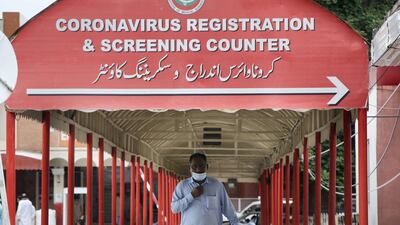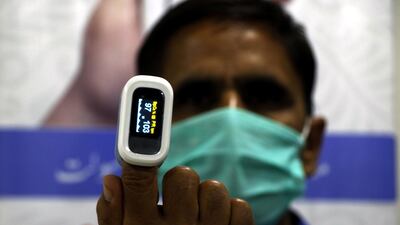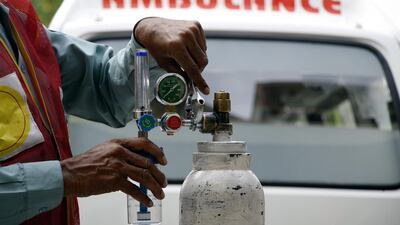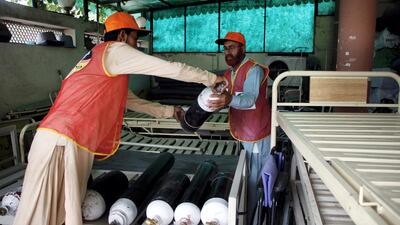Local aid groups in Pakistan are stepping up to supply oxygen to Covid-19 patients in their homes as the country's public and private health infrastructure struggles under the strain of a spike in cases.
The supplies are sorely needed amid a shortage of oxygen supplies in hospitals and on the open market and an almost 100 per cent increase in its price.
“We are providing oxygen cylinders free of cost to needy patients, and those who can’t find it in the hospitals and the market,” said Hamid Ather, president of the Islamabad chapter of the Alkhidmat Foundation, a non-profit based in Lahore that is working in conjunction with four other aid groups to help those in need.
He said the foundation had delivered more than 2,500 oxygen cylinders to the homes of patients in Lahore alone.
The organisation, which is funded by a network of non-government donors and philanthropists, is extending this service through its 11 hospitals across the country and is training patients' family members how to operate the equipment.

Because of limited capacity, hospitals are admitting on critical cases of Covid-19, which affects the lungs and causes difficulty breathing. Less severe cases are quarantined in their homes but still require oxygen to help them breathe, but the majority of them cannot afford to buy the cylinders and pulse oximeters – small devices used to monitor the pulse rate and the amount of oxygen carried in body.
About 25 per cent of Pakistan's 220 million people live in poverty, according to the Asian Development Bank.
There is on average one hospital bed available for every 1,608 people, and one doctor for 963 people, according to the Pakistan Economic Survey conducted in 2019-20. Even before the coronavirus pandemic there were not enough beds for patients, according to a government survey released in June which found "doctors treating two to three patients on one bed in public hospitals of large cities".
Demand for oxygen cylinders has outstripped supply in the country, said Dr Hasan Orooj, the director of General Health Services in Islamabad. “Most of our health infrastructure is not only dysfunctional but also overwhelmed because we weren’t ready to face the challenge of Covid-19,” he said.
So NGOs with connections and funds have stepped in.
“We have provided 10,000 oxygen cylinders besides pulse oximeters and other related equipment to Covid-19 patients free of cost,” said Shakeel Dehlvi, spokesman for the Alamgir Welfare Trust based in the southern port city of Karachi. Demand for oxygen supplies has been increasing since April, and the charity had reached its capacity two months ago, he said.
Last month, the World Health Organisation said the pandemic had increased the global demand for oxygen to 88,000 large cylinders, or 620,000 cubic metres, per day.
Barood Khattak, a student living in a middle class area of Islamabad, had to turn to the Alkhidmat Foundation when four family members contracted the virus last month.
“After five hours of struggle, I couldn’t find even a single cylinder from the local market,” he said.
As of July 24, the tally of Covid-19 cases in the country crossed 270,00, with more than 5,700 deaths, according to government's official figures.
Contradicting the government’s claim that cases are decreasing, Dr Orooj said that up to 90 per cent of the those infected had self-quarantined in their homes and that oxygen is “the most essential commodity” for them.
“If we want to defeat the virus, the community health service system needs to be strengthened,” he said.
The Salman Sufi Foundation, another charity helping to provide patients with oxygen, has even bigger plans.
"We are going to establish the first ever oxygen bank in the country to cater to all future demands," Salman Sufi, its founder, told The National.









